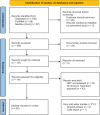A systematic review of HRV during diving in very cold water
- PMID: 37079282
- PMCID: PMC10120448
- DOI: 10.1080/22423982.2023.2203369
A systematic review of HRV during diving in very cold water
Abstract
Heart rate variability (HRV) is a useful method to study the autonomic nervous system (ANS) status. As measuring devices have developed and become smaller, many researchers have become interested in the possibilities to implement the method for diving medicine research. The aim of this study was to review human ANS responses in cold water diving (water temperature <5°C), and to comprise the current knowledge of HRV studies in diving and hyperbaric exposure into one review article. A literature search was conducted on 5 Decemberth 2022, with the search terms "HRV" or "heart rate variability" and "diving" or "diver" or "divers", with search functions of the data bases PubMed and Ovid Medline. Peer reviewed original articles, review articles and case reports were accepted to this review. Twenty-six articles met the pre-defined criteria and were included in this review. Studies from very cold water conditions were rare, but suggested that cold strengthens the ANS responses of diving - especially parasympathetic nervous system (PNS) activity due to the trigeminocardiac reflex and baroreceptor and cardiac stretch receptor activity, caused cold and pressure-induced centralisation of the blood. Overall, studies showed predominant PNS activity when putting the face in water, during immersion and when ambient pressure increased.
Keywords: Cold water diving; arctic; autonomic nervous system; heart rate variability; immersion.
Conflict of interest statement
No potential conflict of interest was reported by the authors.
Figures

Similar articles
-
Diving Responses in Experienced Rebreather Divers: Short-Term Heart Rate Variability in Cold Water Diving.Front Physiol. 2021 Apr 7;12:649319. doi: 10.3389/fphys.2021.649319. eCollection 2021. Front Physiol. 2021. PMID: 33897457 Free PMC article.
-
Diving in the Arctic: Cold Water Immersion's Effects on Heart Rate Variability in Navy Divers.Front Physiol. 2020 Jan 31;10:1600. doi: 10.3389/fphys.2019.01600. eCollection 2019. Front Physiol. 2020. PMID: 32082177 Free PMC article.
-
Effect of immersion, submersion, and scuba diving on heart rate variability.Br J Sports Med. 2001 Jun;35(3):174-80. doi: 10.1136/bjsm.35.3.174. Br J Sports Med. 2001. PMID: 11375876 Free PMC article.
-
Effects of diving and oxygen on autonomic nervous system and cerebral blood flow.Diving Hyperb Med. 2013 Sep;43(3):148-56. Diving Hyperb Med. 2013. PMID: 24122190 Review.
-
[Complex profile of the reflex diving response].Kardiol Pol. 2011;69 Suppl 3:104-14. Kardiol Pol. 2011. PMID: 22125213 Review. Polish.
Cited by
-
Cancer and Stress: Understanding the Connections and Interventions.Am J Lifestyle Med. 2024 Dec 6:15598276241304373. doi: 10.1177/15598276241304373. Online ahead of print. Am J Lifestyle Med. 2024. PMID: 39651486 Free PMC article. Review.
-
Heart rate variability as a digital biomarker for frailty in cardiovascular patients.J Frailty Aging. 2025 Feb;14(1):100007. doi: 10.1016/j.tjfa.2024.100007. Epub 2025 Jan 1. J Frailty Aging. 2025. PMID: 39855886 Free PMC article.
-
Human performance and medical treatment during cold weather operations - synthesis of a symposium.Int J Circumpolar Health. 2023 Dec;82(1):2246666. doi: 10.1080/22423982.2023.2246666. Int J Circumpolar Health. 2023. PMID: 37594504 Free PMC article. Review.
-
Depth of SCUBA Diving Affects Cardiac Autonomic Nervous System.Pathophysiology. 2024 Mar 29;31(2):183-189. doi: 10.3390/pathophysiology31020014. Pathophysiology. 2024. PMID: 38651402 Free PMC article.
References
-
- Wuorimaa T, Lundell RV.. Vapaasukeltamisen fysiologiaa – Mitä hengitystä pidättäessä kehos-sa tapahtuu ja miten syvyyden tuoma paine vaikuttaa elimistöön? Duodecim. 2022;138(8):661–12.
Publication types
MeSH terms
Substances
LinkOut - more resources
Full Text Sources
Research Materials
Miscellaneous
